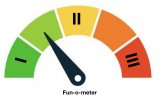Bauer
Level 8 Valued Member
Personally, I used to track stuff like reps and weight for KB presses and/or ballistics, analyzing trends in tonnage, density, and average reps per set. For example, when I experimented with block training for a year, this approach helped me to check if I was still progressing and thus, if my programming worked. I could actually compare it with non-block training.
But when it comes to running, I have decided against tracking distance, and only record how many minutes I run per session (not counting walking breaks). I know that if I tracked distance, I would like to pump those numbers up, possibly leading to too much too soon. (Running is my side dish.)

The beauty with recording running minutes is, that you can pump those numbers up by running more slowly. Therefore, this way of tracking nudges me to keep it easy. I then look at monthly and weekly total running times.
Which metrics do you track? And why?
If you don't track anything, why is that?
But when it comes to running, I have decided against tracking distance, and only record how many minutes I run per session (not counting walking breaks). I know that if I tracked distance, I would like to pump those numbers up, possibly leading to too much too soon. (Running is my side dish.)

The beauty with recording running minutes is, that you can pump those numbers up by running more slowly. Therefore, this way of tracking nudges me to keep it easy. I then look at monthly and weekly total running times.
Which metrics do you track? And why?
If you don't track anything, why is that?

